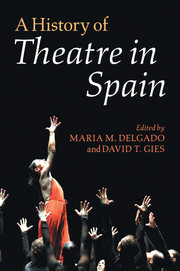Book contents
- Frontmatter
- Contents
- Illustrations
- Contributors
- Acknowledgements
- Introduction
- 1 The challenges of historiography
- 2 Lope de Vega, Calderón de la Barca and Tirso de Molina
- 3 The world as a stage
- 4 Playing the palace
- 5 The art of the actor, 1565–1833
- 6 Theatrical infrastructures, dramatic production and performance, 1700–1759
- 7 Popular theatre and the Spanish stage, 1737–1798
- 8 Theatre of the elites, neoclassicism and the Enlightenment, 1750–1808
- 9 Actors and agency in the modern era, 1801–2010
- 10 Zarzuela
- 11 Nineteenth-century Spanish theatre
- 12 Copyright, buildings, spaces and the nineteenth-century stage
- 13 Modernism and the avant-garde in fin-de-siècle Barcelona and Madrid
- 14 Continuity and innovation in Spanish theatre, 1900–1936
- 15 Theatrical activities during the Spanish Civil War, 1936–1939
- 16 Theatre, colonialism, exile and the Americas
- 17 Theatre under Franco (1939–1975)
- 18 Flamenco
- 19 Nationalism, identity and the theatre across the Spanish state in the democratic era, 1975–2010
- 20 Directors and the Spanish stage, 1823–2010
- 21 This evolution is still ongoing
- 22 Theatre as a process of discovery
- 23 Theatre is the art of the future
- Select bibliography
- Index
- References
7 - Popular theatre and the Spanish stage, 1737–1798
Published online by Cambridge University Press: 05 June 2012
- Frontmatter
- Contents
- Illustrations
- Contributors
- Acknowledgements
- Introduction
- 1 The challenges of historiography
- 2 Lope de Vega, Calderón de la Barca and Tirso de Molina
- 3 The world as a stage
- 4 Playing the palace
- 5 The art of the actor, 1565–1833
- 6 Theatrical infrastructures, dramatic production and performance, 1700–1759
- 7 Popular theatre and the Spanish stage, 1737–1798
- 8 Theatre of the elites, neoclassicism and the Enlightenment, 1750–1808
- 9 Actors and agency in the modern era, 1801–2010
- 10 Zarzuela
- 11 Nineteenth-century Spanish theatre
- 12 Copyright, buildings, spaces and the nineteenth-century stage
- 13 Modernism and the avant-garde in fin-de-siècle Barcelona and Madrid
- 14 Continuity and innovation in Spanish theatre, 1900–1936
- 15 Theatrical activities during the Spanish Civil War, 1936–1939
- 16 Theatre, colonialism, exile and the Americas
- 17 Theatre under Franco (1939–1975)
- 18 Flamenco
- 19 Nationalism, identity and the theatre across the Spanish state in the democratic era, 1975–2010
- 20 Directors and the Spanish stage, 1823–2010
- 21 This evolution is still ongoing
- 22 Theatre as a process of discovery
- 23 Theatre is the art of the future
- Select bibliography
- Index
- References
Summary
Numerous critiques were written in the early decades of the eighteenth century that condemned contemporary theatre on moral grounds. The originality of Poética (Poetics, 1737), by Ignacio de Luzán (1702–54), is that it adds an aesthetic charge to the accusation of immorality. Luzán proposed changing the direction of Spanish dramatic literature in favour of a classicism based upon Horace's comic model. He also looked to the French practices of the seventeenth century, to Corneille and Racine, in order to reinvigorate the Spanish interest in tragedy, and to Molière, in order to remind his readers that comedy must not merely entertain, but also prove verisimilar and morally useful.
Those critics who wanted to lay the foundations for this new rule-conscious or neoclassical comedy disapproved of the theatrical poetics of Lope de Vega (1562–1635), as laid out in his Arte nuevo de hacer comedias (New Art of Writing Plays, 1609). Lope based his dramatic formulas on his experience as a dramatist, rather than the opinion of the authorities. The theatrical strategies of Calderón de la Barca (1600–81), an author in the service of the court as of 1651, did not take into account the tastes of the masses as conspicuously as Lope's did. Therefore, it was Lope who was most severely criticised for being disorderly (at least from the neoclassical perspective). Accordingly, Lope appeared as the theatre-maker most responsible for the chaos of the repertory and for what was taken to be the contemporary stage's reliance on ‘bad’ baroque comedy. What is more, these defects were pointed out not by national, but rather by foreign intellectuals.
- Type
- Chapter
- Information
- A History of Theatre in Spain , pp. 134 - 156Publisher: Cambridge University PressPrint publication year: 2012



